Interpersonal Conflict Management Among Project Management Students: A Literature Review
VerifiedAdded on 2023/06/04
|12
|3383
|256
AI Summary
This literature review analyzes the significance of interpersonal conflict management among project management students. It identifies important aspects of conflict management and how it can help to improve the performance of the organization as well as students.
Contribute Materials
Your contribution can guide someone’s learning journey. Share your
documents today.
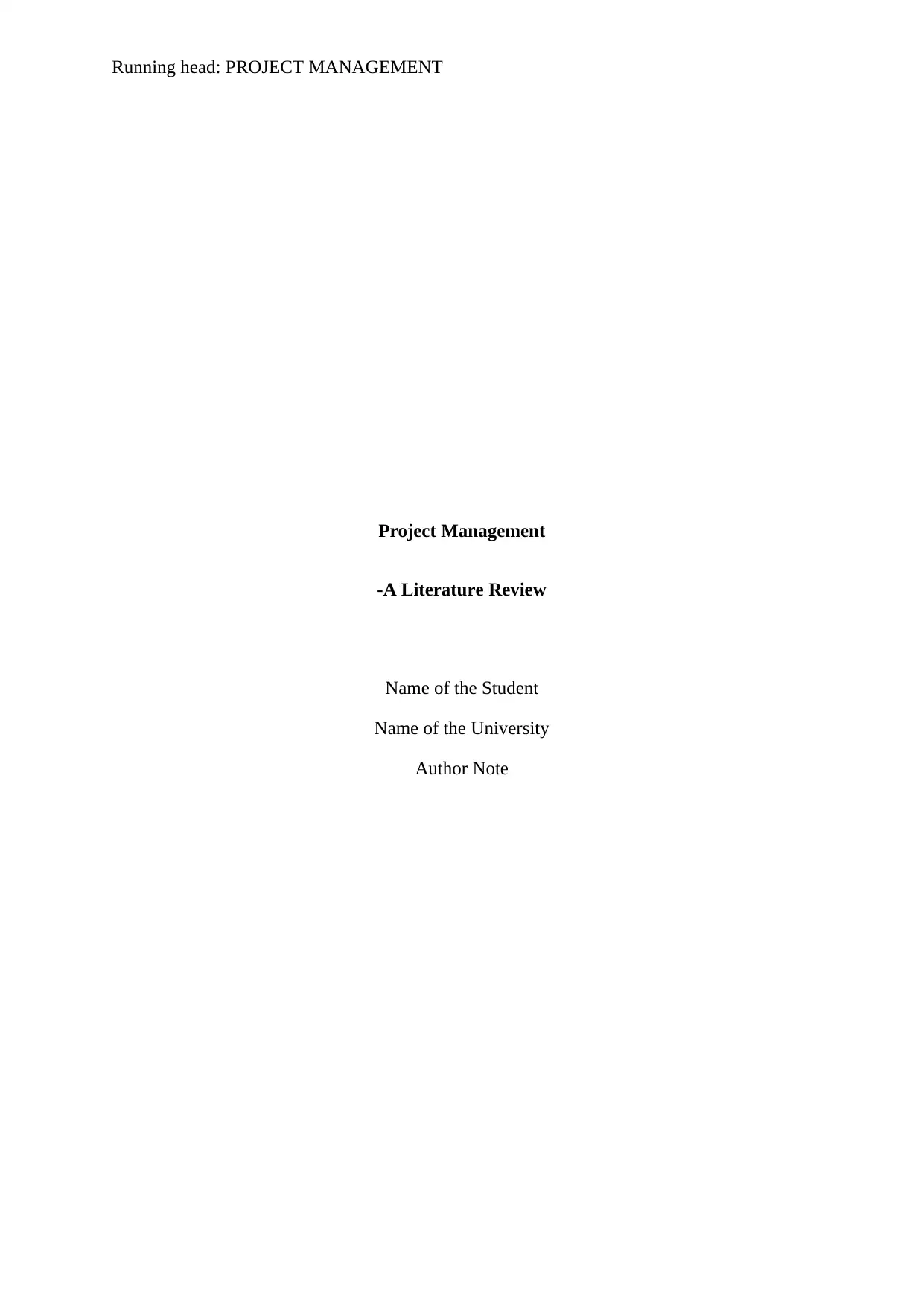
Running head: PROJECT MANAGEMENT
Project Management
-A Literature Review
Name of the Student
Name of the University
Author Note
Project Management
-A Literature Review
Name of the Student
Name of the University
Author Note
Secure Best Marks with AI Grader
Need help grading? Try our AI Grader for instant feedback on your assignments.
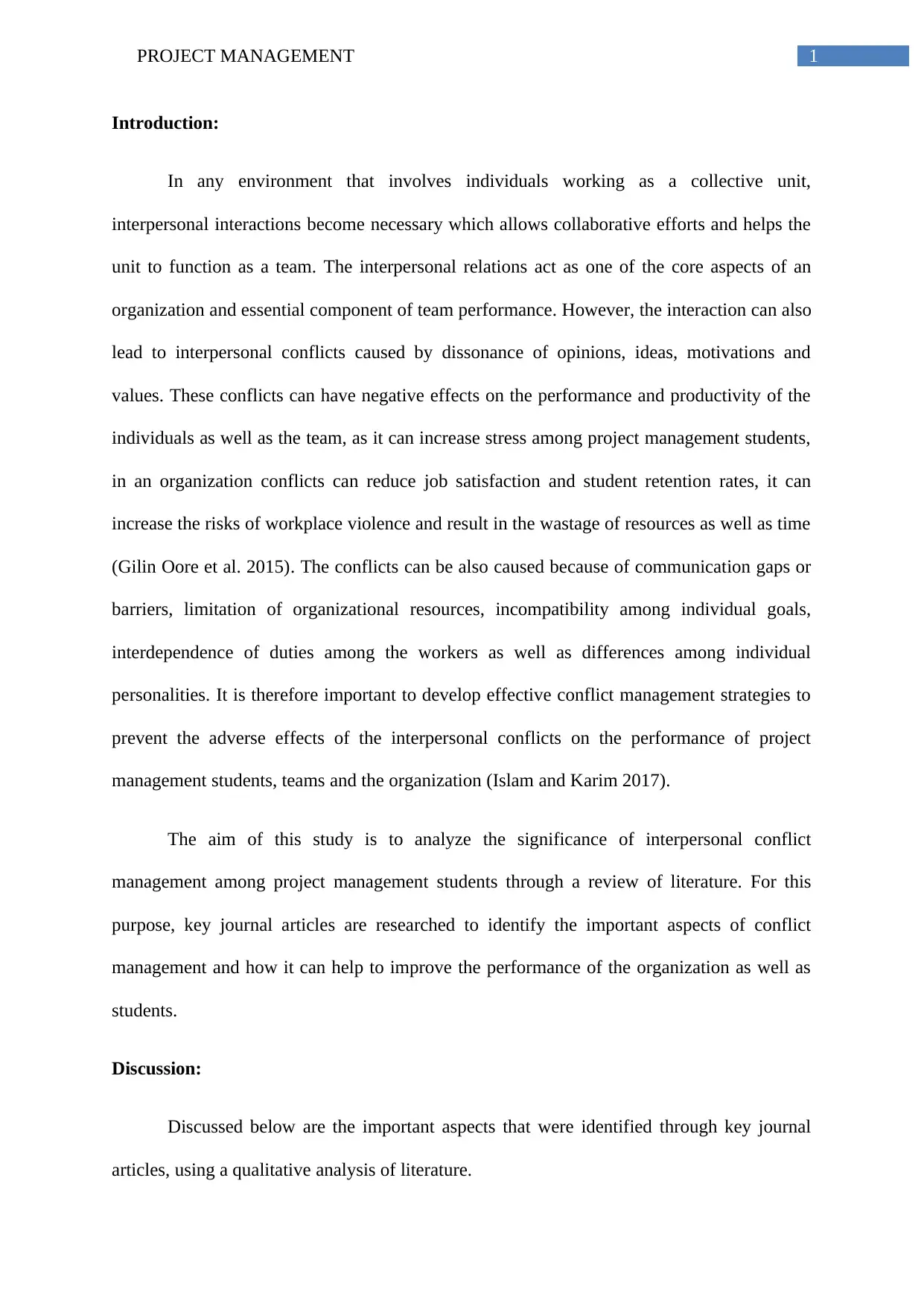
1PROJECT MANAGEMENT
Introduction:
In any environment that involves individuals working as a collective unit,
interpersonal interactions become necessary which allows collaborative efforts and helps the
unit to function as a team. The interpersonal relations act as one of the core aspects of an
organization and essential component of team performance. However, the interaction can also
lead to interpersonal conflicts caused by dissonance of opinions, ideas, motivations and
values. These conflicts can have negative effects on the performance and productivity of the
individuals as well as the team, as it can increase stress among project management students,
in an organization conflicts can reduce job satisfaction and student retention rates, it can
increase the risks of workplace violence and result in the wastage of resources as well as time
(Gilin Oore et al. 2015). The conflicts can be also caused because of communication gaps or
barriers, limitation of organizational resources, incompatibility among individual goals,
interdependence of duties among the workers as well as differences among individual
personalities. It is therefore important to develop effective conflict management strategies to
prevent the adverse effects of the interpersonal conflicts on the performance of project
management students, teams and the organization (Islam and Karim 2017).
The aim of this study is to analyze the significance of interpersonal conflict
management among project management students through a review of literature. For this
purpose, key journal articles are researched to identify the important aspects of conflict
management and how it can help to improve the performance of the organization as well as
students.
Discussion:
Discussed below are the important aspects that were identified through key journal
articles, using a qualitative analysis of literature.
Introduction:
In any environment that involves individuals working as a collective unit,
interpersonal interactions become necessary which allows collaborative efforts and helps the
unit to function as a team. The interpersonal relations act as one of the core aspects of an
organization and essential component of team performance. However, the interaction can also
lead to interpersonal conflicts caused by dissonance of opinions, ideas, motivations and
values. These conflicts can have negative effects on the performance and productivity of the
individuals as well as the team, as it can increase stress among project management students,
in an organization conflicts can reduce job satisfaction and student retention rates, it can
increase the risks of workplace violence and result in the wastage of resources as well as time
(Gilin Oore et al. 2015). The conflicts can be also caused because of communication gaps or
barriers, limitation of organizational resources, incompatibility among individual goals,
interdependence of duties among the workers as well as differences among individual
personalities. It is therefore important to develop effective conflict management strategies to
prevent the adverse effects of the interpersonal conflicts on the performance of project
management students, teams and the organization (Islam and Karim 2017).
The aim of this study is to analyze the significance of interpersonal conflict
management among project management students through a review of literature. For this
purpose, key journal articles are researched to identify the important aspects of conflict
management and how it can help to improve the performance of the organization as well as
students.
Discussion:
Discussed below are the important aspects that were identified through key journal
articles, using a qualitative analysis of literature.
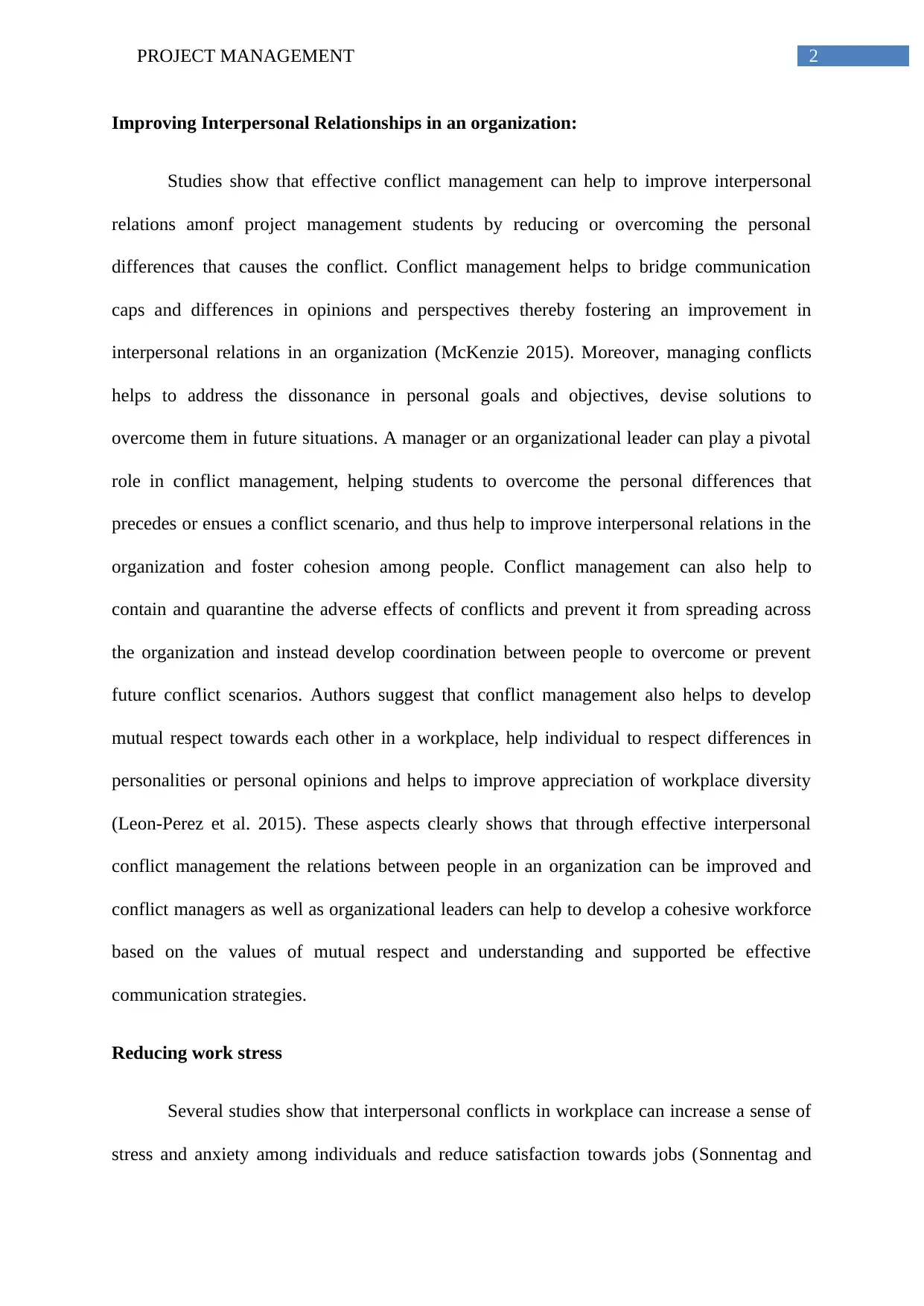
2PROJECT MANAGEMENT
Improving Interpersonal Relationships in an organization:
Studies show that effective conflict management can help to improve interpersonal
relations amonf project management students by reducing or overcoming the personal
differences that causes the conflict. Conflict management helps to bridge communication
caps and differences in opinions and perspectives thereby fostering an improvement in
interpersonal relations in an organization (McKenzie 2015). Moreover, managing conflicts
helps to address the dissonance in personal goals and objectives, devise solutions to
overcome them in future situations. A manager or an organizational leader can play a pivotal
role in conflict management, helping students to overcome the personal differences that
precedes or ensues a conflict scenario, and thus help to improve interpersonal relations in the
organization and foster cohesion among people. Conflict management can also help to
contain and quarantine the adverse effects of conflicts and prevent it from spreading across
the organization and instead develop coordination between people to overcome or prevent
future conflict scenarios. Authors suggest that conflict management also helps to develop
mutual respect towards each other in a workplace, help individual to respect differences in
personalities or personal opinions and helps to improve appreciation of workplace diversity
(Leon-Perez et al. 2015). These aspects clearly shows that through effective interpersonal
conflict management the relations between people in an organization can be improved and
conflict managers as well as organizational leaders can help to develop a cohesive workforce
based on the values of mutual respect and understanding and supported be effective
communication strategies.
Reducing work stress
Several studies show that interpersonal conflicts in workplace can increase a sense of
stress and anxiety among individuals and reduce satisfaction towards jobs (Sonnentag and
Improving Interpersonal Relationships in an organization:
Studies show that effective conflict management can help to improve interpersonal
relations amonf project management students by reducing or overcoming the personal
differences that causes the conflict. Conflict management helps to bridge communication
caps and differences in opinions and perspectives thereby fostering an improvement in
interpersonal relations in an organization (McKenzie 2015). Moreover, managing conflicts
helps to address the dissonance in personal goals and objectives, devise solutions to
overcome them in future situations. A manager or an organizational leader can play a pivotal
role in conflict management, helping students to overcome the personal differences that
precedes or ensues a conflict scenario, and thus help to improve interpersonal relations in the
organization and foster cohesion among people. Conflict management can also help to
contain and quarantine the adverse effects of conflicts and prevent it from spreading across
the organization and instead develop coordination between people to overcome or prevent
future conflict scenarios. Authors suggest that conflict management also helps to develop
mutual respect towards each other in a workplace, help individual to respect differences in
personalities or personal opinions and helps to improve appreciation of workplace diversity
(Leon-Perez et al. 2015). These aspects clearly shows that through effective interpersonal
conflict management the relations between people in an organization can be improved and
conflict managers as well as organizational leaders can help to develop a cohesive workforce
based on the values of mutual respect and understanding and supported be effective
communication strategies.
Reducing work stress
Several studies show that interpersonal conflicts in workplace can increase a sense of
stress and anxiety among individuals and reduce satisfaction towards jobs (Sonnentag and
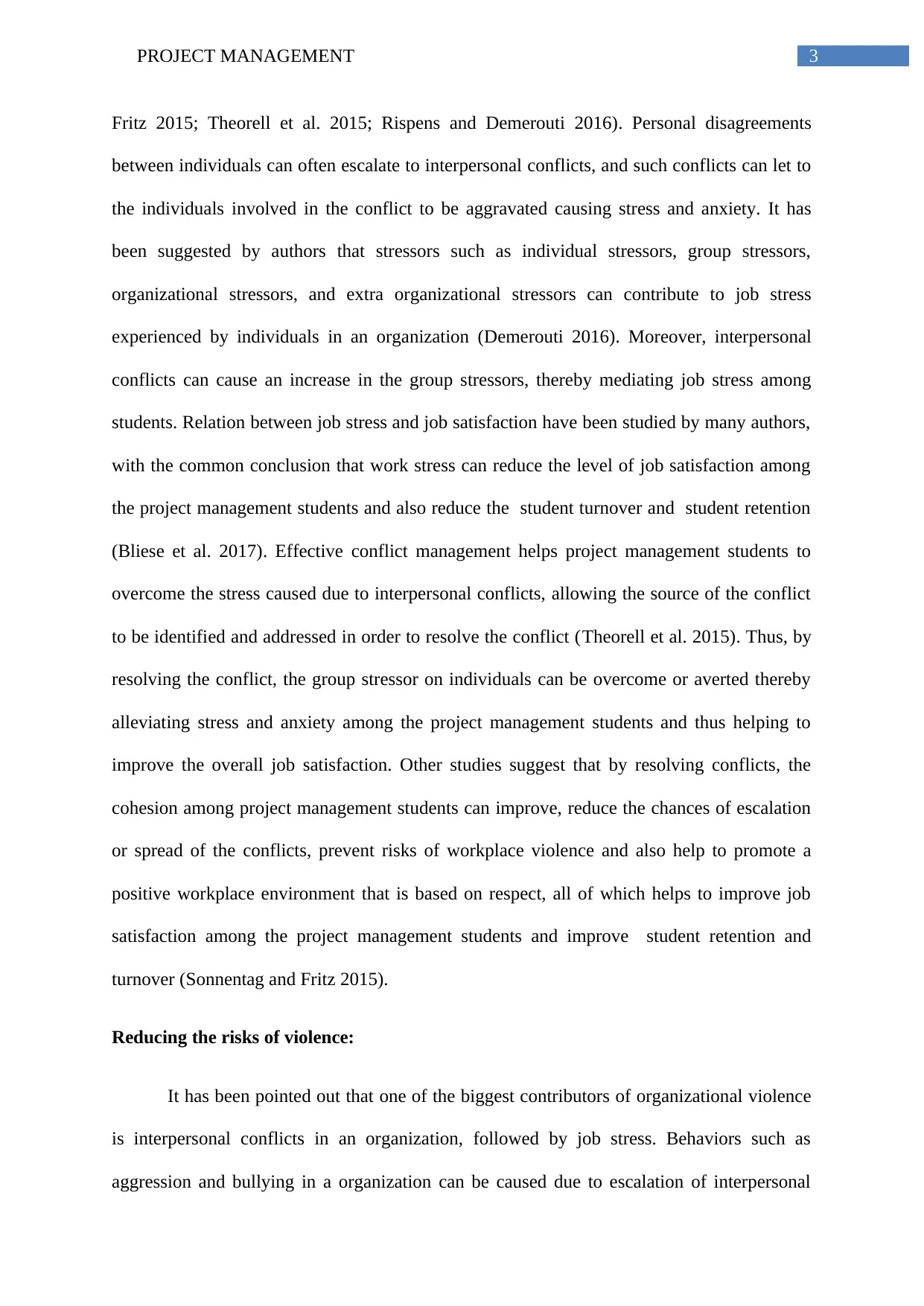
3PROJECT MANAGEMENT
Fritz 2015; Theorell et al. 2015; Rispens and Demerouti 2016). Personal disagreements
between individuals can often escalate to interpersonal conflicts, and such conflicts can let to
the individuals involved in the conflict to be aggravated causing stress and anxiety. It has
been suggested by authors that stressors such as individual stressors, group stressors,
organizational stressors, and extra organizational stressors can contribute to job stress
experienced by individuals in an organization (Demerouti 2016). Moreover, interpersonal
conflicts can cause an increase in the group stressors, thereby mediating job stress among
students. Relation between job stress and job satisfaction have been studied by many authors,
with the common conclusion that work stress can reduce the level of job satisfaction among
the project management students and also reduce the student turnover and student retention
(Bliese et al. 2017). Effective conflict management helps project management students to
overcome the stress caused due to interpersonal conflicts, allowing the source of the conflict
to be identified and addressed in order to resolve the conflict (Theorell et al. 2015). Thus, by
resolving the conflict, the group stressor on individuals can be overcome or averted thereby
alleviating stress and anxiety among the project management students and thus helping to
improve the overall job satisfaction. Other studies suggest that by resolving conflicts, the
cohesion among project management students can improve, reduce the chances of escalation
or spread of the conflicts, prevent risks of workplace violence and also help to promote a
positive workplace environment that is based on respect, all of which helps to improve job
satisfaction among the project management students and improve student retention and
turnover (Sonnentag and Fritz 2015).
Reducing the risks of violence:
It has been pointed out that one of the biggest contributors of organizational violence
is interpersonal conflicts in an organization, followed by job stress. Behaviors such as
aggression and bullying in a organization can be caused due to escalation of interpersonal
Fritz 2015; Theorell et al. 2015; Rispens and Demerouti 2016). Personal disagreements
between individuals can often escalate to interpersonal conflicts, and such conflicts can let to
the individuals involved in the conflict to be aggravated causing stress and anxiety. It has
been suggested by authors that stressors such as individual stressors, group stressors,
organizational stressors, and extra organizational stressors can contribute to job stress
experienced by individuals in an organization (Demerouti 2016). Moreover, interpersonal
conflicts can cause an increase in the group stressors, thereby mediating job stress among
students. Relation between job stress and job satisfaction have been studied by many authors,
with the common conclusion that work stress can reduce the level of job satisfaction among
the project management students and also reduce the student turnover and student retention
(Bliese et al. 2017). Effective conflict management helps project management students to
overcome the stress caused due to interpersonal conflicts, allowing the source of the conflict
to be identified and addressed in order to resolve the conflict (Theorell et al. 2015). Thus, by
resolving the conflict, the group stressor on individuals can be overcome or averted thereby
alleviating stress and anxiety among the project management students and thus helping to
improve the overall job satisfaction. Other studies suggest that by resolving conflicts, the
cohesion among project management students can improve, reduce the chances of escalation
or spread of the conflicts, prevent risks of workplace violence and also help to promote a
positive workplace environment that is based on respect, all of which helps to improve job
satisfaction among the project management students and improve student retention and
turnover (Sonnentag and Fritz 2015).
Reducing the risks of violence:
It has been pointed out that one of the biggest contributors of organizational violence
is interpersonal conflicts in an organization, followed by job stress. Behaviors such as
aggression and bullying in a organization can be caused due to escalation of interpersonal
Secure Best Marks with AI Grader
Need help grading? Try our AI Grader for instant feedback on your assignments.
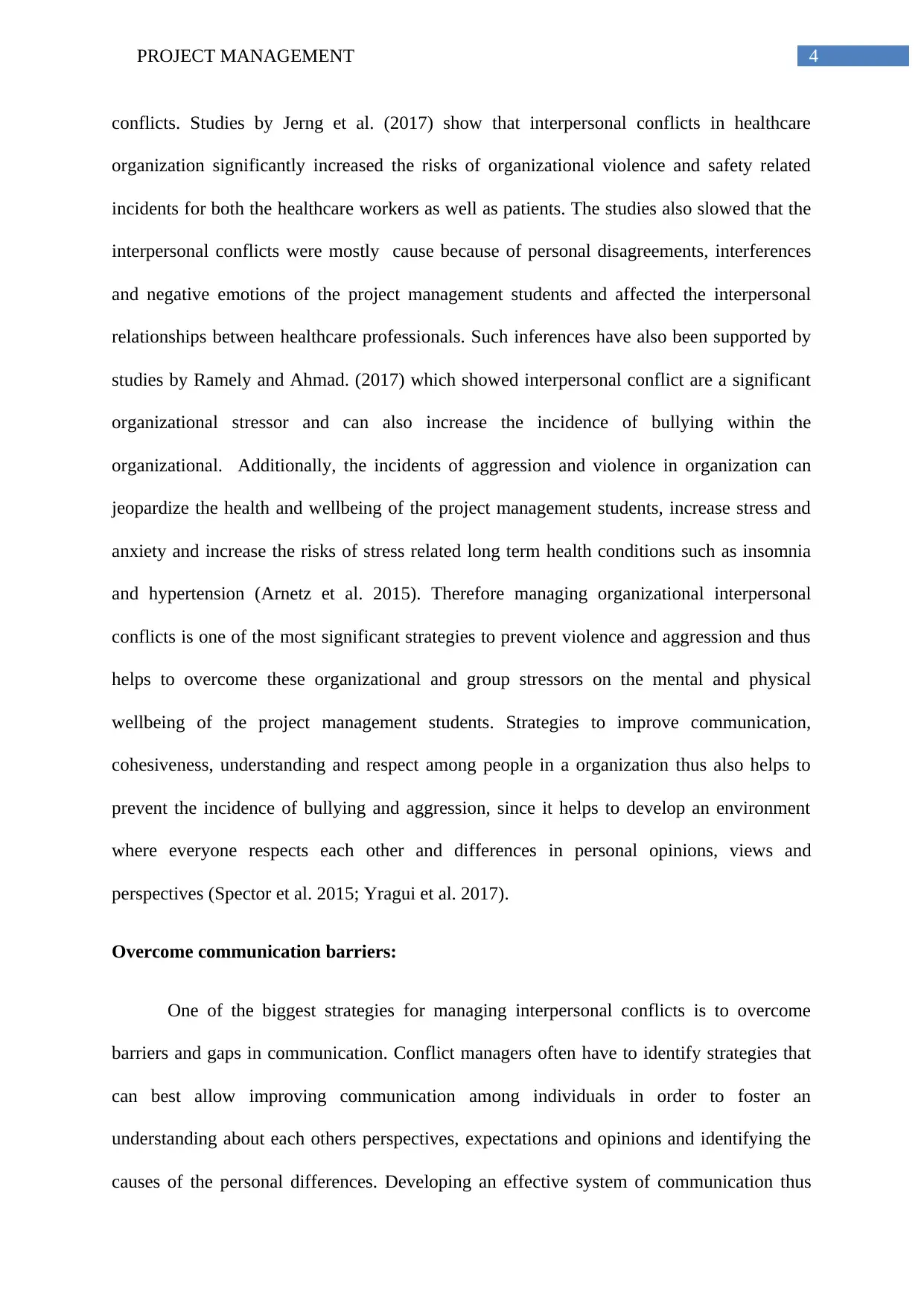
4PROJECT MANAGEMENT
conflicts. Studies by Jerng et al. (2017) show that interpersonal conflicts in healthcare
organization significantly increased the risks of organizational violence and safety related
incidents for both the healthcare workers as well as patients. The studies also slowed that the
interpersonal conflicts were mostly cause because of personal disagreements, interferences
and negative emotions of the project management students and affected the interpersonal
relationships between healthcare professionals. Such inferences have also been supported by
studies by Ramely and Ahmad. (2017) which showed interpersonal conflict are a significant
organizational stressor and can also increase the incidence of bullying within the
organizational. Additionally, the incidents of aggression and violence in organization can
jeopardize the health and wellbeing of the project management students, increase stress and
anxiety and increase the risks of stress related long term health conditions such as insomnia
and hypertension (Arnetz et al. 2015). Therefore managing organizational interpersonal
conflicts is one of the most significant strategies to prevent violence and aggression and thus
helps to overcome these organizational and group stressors on the mental and physical
wellbeing of the project management students. Strategies to improve communication,
cohesiveness, understanding and respect among people in a organization thus also helps to
prevent the incidence of bullying and aggression, since it helps to develop an environment
where everyone respects each other and differences in personal opinions, views and
perspectives (Spector et al. 2015; Yragui et al. 2017).
Overcome communication barriers:
One of the biggest strategies for managing interpersonal conflicts is to overcome
barriers and gaps in communication. Conflict managers often have to identify strategies that
can best allow improving communication among individuals in order to foster an
understanding about each others perspectives, expectations and opinions and identifying the
causes of the personal differences. Developing an effective system of communication thus
conflicts. Studies by Jerng et al. (2017) show that interpersonal conflicts in healthcare
organization significantly increased the risks of organizational violence and safety related
incidents for both the healthcare workers as well as patients. The studies also slowed that the
interpersonal conflicts were mostly cause because of personal disagreements, interferences
and negative emotions of the project management students and affected the interpersonal
relationships between healthcare professionals. Such inferences have also been supported by
studies by Ramely and Ahmad. (2017) which showed interpersonal conflict are a significant
organizational stressor and can also increase the incidence of bullying within the
organizational. Additionally, the incidents of aggression and violence in organization can
jeopardize the health and wellbeing of the project management students, increase stress and
anxiety and increase the risks of stress related long term health conditions such as insomnia
and hypertension (Arnetz et al. 2015). Therefore managing organizational interpersonal
conflicts is one of the most significant strategies to prevent violence and aggression and thus
helps to overcome these organizational and group stressors on the mental and physical
wellbeing of the project management students. Strategies to improve communication,
cohesiveness, understanding and respect among people in a organization thus also helps to
prevent the incidence of bullying and aggression, since it helps to develop an environment
where everyone respects each other and differences in personal opinions, views and
perspectives (Spector et al. 2015; Yragui et al. 2017).
Overcome communication barriers:
One of the biggest strategies for managing interpersonal conflicts is to overcome
barriers and gaps in communication. Conflict managers often have to identify strategies that
can best allow improving communication among individuals in order to foster an
understanding about each others perspectives, expectations and opinions and identifying the
causes of the personal differences. Developing an effective system of communication thus
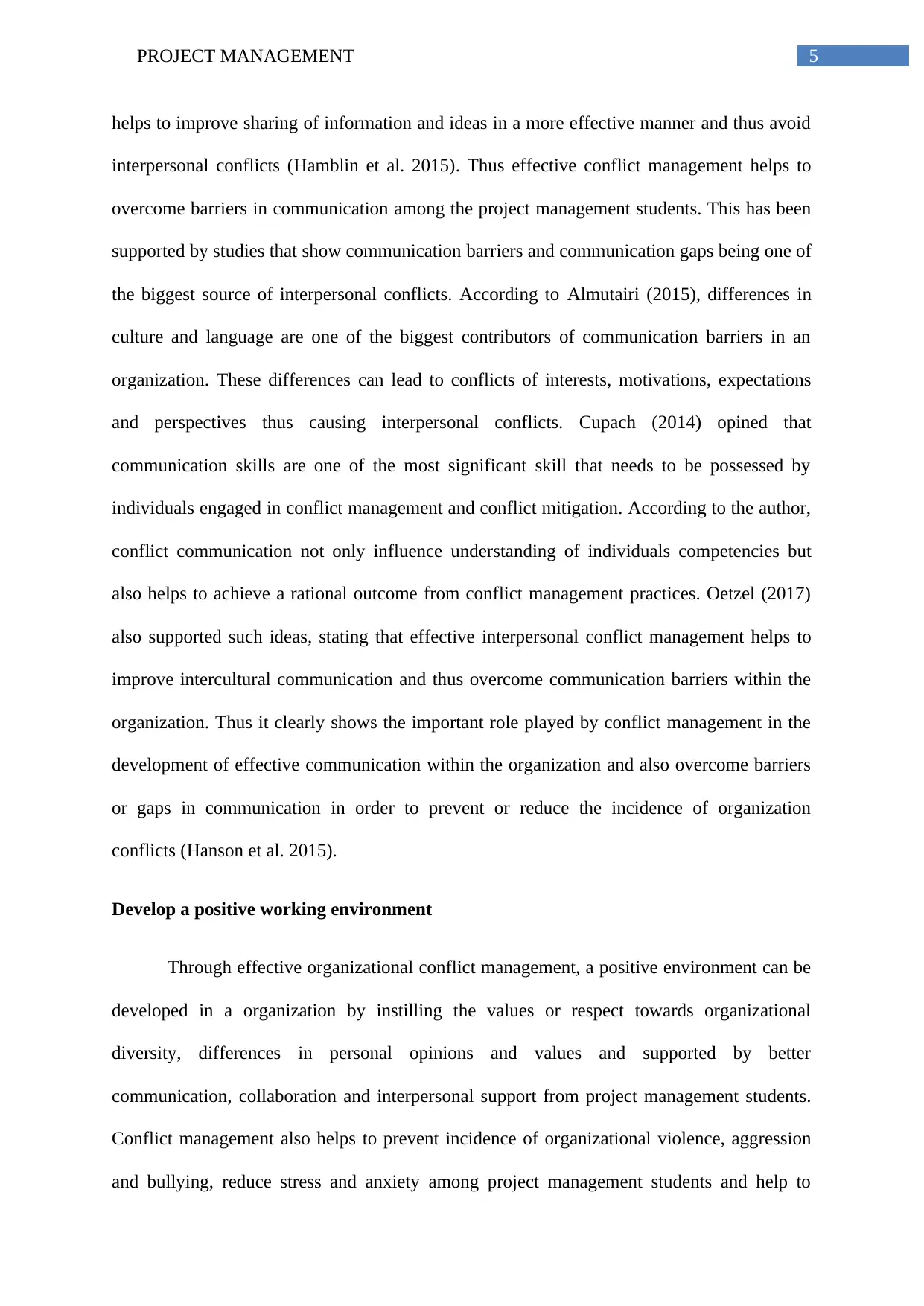
5PROJECT MANAGEMENT
helps to improve sharing of information and ideas in a more effective manner and thus avoid
interpersonal conflicts (Hamblin et al. 2015). Thus effective conflict management helps to
overcome barriers in communication among the project management students. This has been
supported by studies that show communication barriers and communication gaps being one of
the biggest source of interpersonal conflicts. According to Almutairi (2015), differences in
culture and language are one of the biggest contributors of communication barriers in an
organization. These differences can lead to conflicts of interests, motivations, expectations
and perspectives thus causing interpersonal conflicts. Cupach (2014) opined that
communication skills are one of the most significant skill that needs to be possessed by
individuals engaged in conflict management and conflict mitigation. According to the author,
conflict communication not only influence understanding of individuals competencies but
also helps to achieve a rational outcome from conflict management practices. Oetzel (2017)
also supported such ideas, stating that effective interpersonal conflict management helps to
improve intercultural communication and thus overcome communication barriers within the
organization. Thus it clearly shows the important role played by conflict management in the
development of effective communication within the organization and also overcome barriers
or gaps in communication in order to prevent or reduce the incidence of organization
conflicts (Hanson et al. 2015).
Develop a positive working environment
Through effective organizational conflict management, a positive environment can be
developed in a organization by instilling the values or respect towards organizational
diversity, differences in personal opinions and values and supported by better
communication, collaboration and interpersonal support from project management students.
Conflict management also helps to prevent incidence of organizational violence, aggression
and bullying, reduce stress and anxiety among project management students and help to
helps to improve sharing of information and ideas in a more effective manner and thus avoid
interpersonal conflicts (Hamblin et al. 2015). Thus effective conflict management helps to
overcome barriers in communication among the project management students. This has been
supported by studies that show communication barriers and communication gaps being one of
the biggest source of interpersonal conflicts. According to Almutairi (2015), differences in
culture and language are one of the biggest contributors of communication barriers in an
organization. These differences can lead to conflicts of interests, motivations, expectations
and perspectives thus causing interpersonal conflicts. Cupach (2014) opined that
communication skills are one of the most significant skill that needs to be possessed by
individuals engaged in conflict management and conflict mitigation. According to the author,
conflict communication not only influence understanding of individuals competencies but
also helps to achieve a rational outcome from conflict management practices. Oetzel (2017)
also supported such ideas, stating that effective interpersonal conflict management helps to
improve intercultural communication and thus overcome communication barriers within the
organization. Thus it clearly shows the important role played by conflict management in the
development of effective communication within the organization and also overcome barriers
or gaps in communication in order to prevent or reduce the incidence of organization
conflicts (Hanson et al. 2015).
Develop a positive working environment
Through effective organizational conflict management, a positive environment can be
developed in a organization by instilling the values or respect towards organizational
diversity, differences in personal opinions and values and supported by better
communication, collaboration and interpersonal support from project management students.
Conflict management also helps to prevent incidence of organizational violence, aggression
and bullying, reduce stress and anxiety among project management students and help to
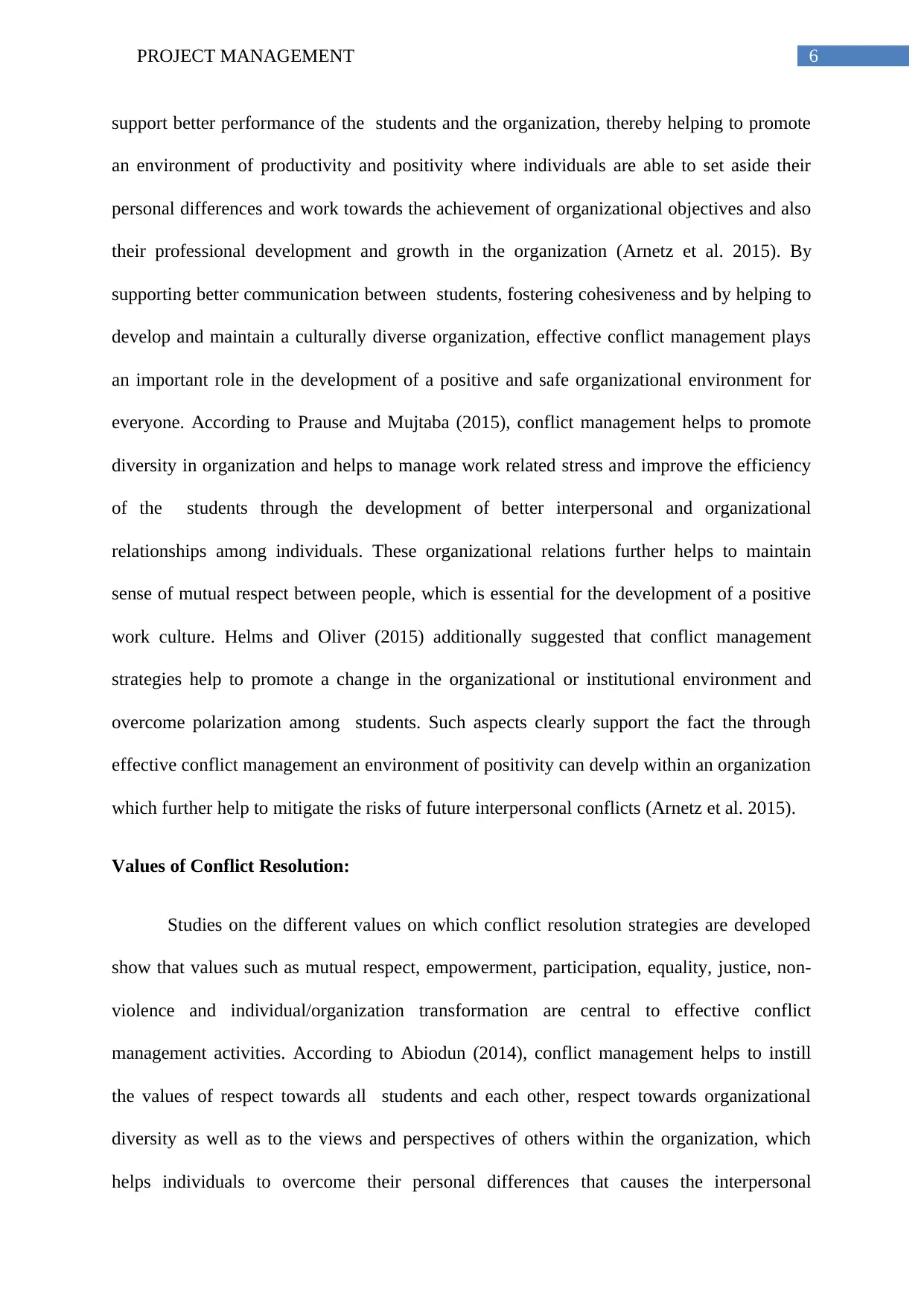
6PROJECT MANAGEMENT
support better performance of the students and the organization, thereby helping to promote
an environment of productivity and positivity where individuals are able to set aside their
personal differences and work towards the achievement of organizational objectives and also
their professional development and growth in the organization (Arnetz et al. 2015). By
supporting better communication between students, fostering cohesiveness and by helping to
develop and maintain a culturally diverse organization, effective conflict management plays
an important role in the development of a positive and safe organizational environment for
everyone. According to Prause and Mujtaba (2015), conflict management helps to promote
diversity in organization and helps to manage work related stress and improve the efficiency
of the students through the development of better interpersonal and organizational
relationships among individuals. These organizational relations further helps to maintain
sense of mutual respect between people, which is essential for the development of a positive
work culture. Helms and Oliver (2015) additionally suggested that conflict management
strategies help to promote a change in the organizational or institutional environment and
overcome polarization among students. Such aspects clearly support the fact the through
effective conflict management an environment of positivity can develp within an organization
which further help to mitigate the risks of future interpersonal conflicts (Arnetz et al. 2015).
Values of Conflict Resolution:
Studies on the different values on which conflict resolution strategies are developed
show that values such as mutual respect, empowerment, participation, equality, justice, non-
violence and individual/organization transformation are central to effective conflict
management activities. According to Abiodun (2014), conflict management helps to instill
the values of respect towards all students and each other, respect towards organizational
diversity as well as to the views and perspectives of others within the organization, which
helps individuals to overcome their personal differences that causes the interpersonal
support better performance of the students and the organization, thereby helping to promote
an environment of productivity and positivity where individuals are able to set aside their
personal differences and work towards the achievement of organizational objectives and also
their professional development and growth in the organization (Arnetz et al. 2015). By
supporting better communication between students, fostering cohesiveness and by helping to
develop and maintain a culturally diverse organization, effective conflict management plays
an important role in the development of a positive and safe organizational environment for
everyone. According to Prause and Mujtaba (2015), conflict management helps to promote
diversity in organization and helps to manage work related stress and improve the efficiency
of the students through the development of better interpersonal and organizational
relationships among individuals. These organizational relations further helps to maintain
sense of mutual respect between people, which is essential for the development of a positive
work culture. Helms and Oliver (2015) additionally suggested that conflict management
strategies help to promote a change in the organizational or institutional environment and
overcome polarization among students. Such aspects clearly support the fact the through
effective conflict management an environment of positivity can develp within an organization
which further help to mitigate the risks of future interpersonal conflicts (Arnetz et al. 2015).
Values of Conflict Resolution:
Studies on the different values on which conflict resolution strategies are developed
show that values such as mutual respect, empowerment, participation, equality, justice, non-
violence and individual/organization transformation are central to effective conflict
management activities. According to Abiodun (2014), conflict management helps to instill
the values of respect towards all students and each other, respect towards organizational
diversity as well as to the views and perspectives of others within the organization, which
helps individuals to overcome their personal differences that causes the interpersonal
Paraphrase This Document
Need a fresh take? Get an instant paraphrase of this document with our AI Paraphraser
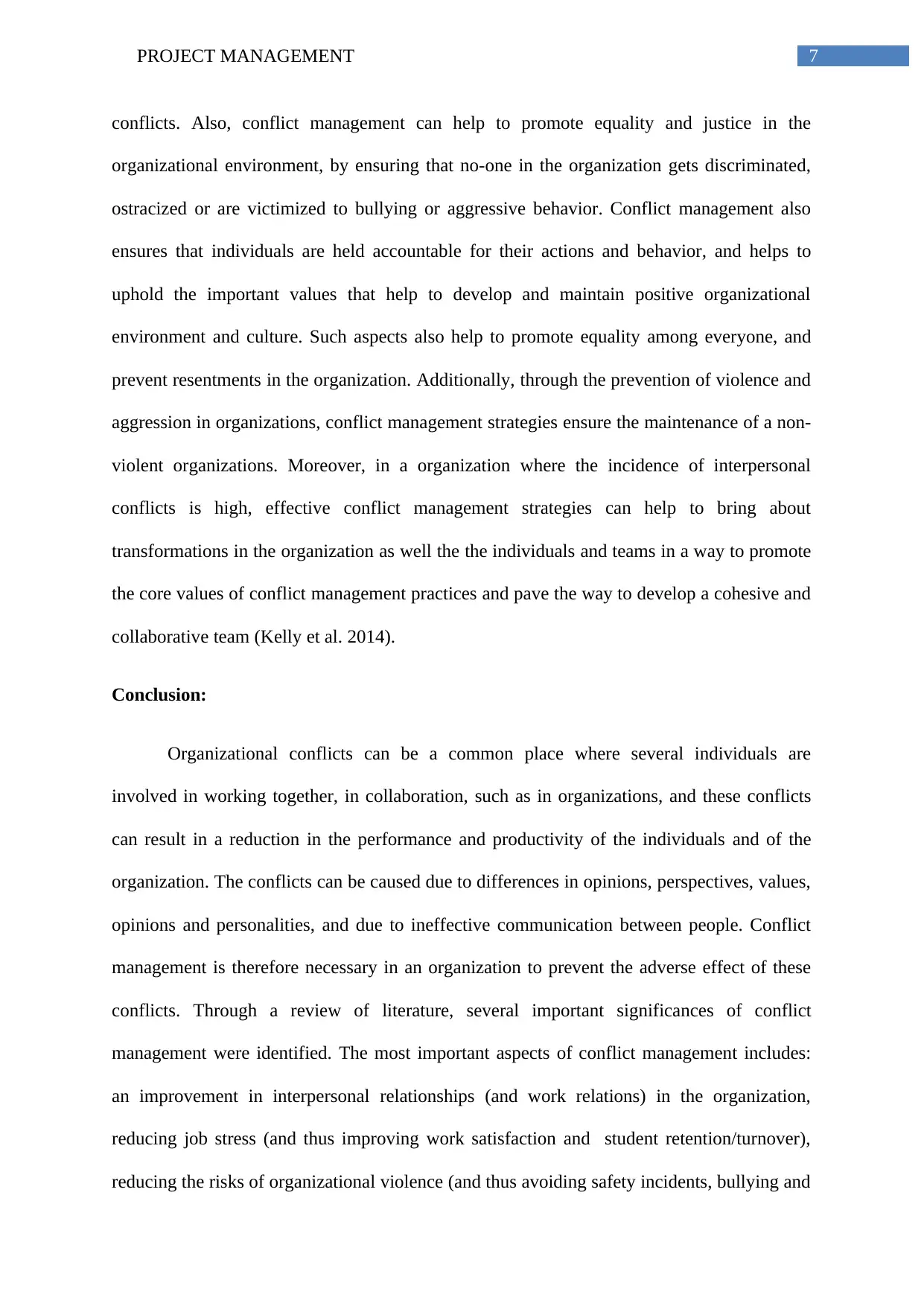
7PROJECT MANAGEMENT
conflicts. Also, conflict management can help to promote equality and justice in the
organizational environment, by ensuring that no-one in the organization gets discriminated,
ostracized or are victimized to bullying or aggressive behavior. Conflict management also
ensures that individuals are held accountable for their actions and behavior, and helps to
uphold the important values that help to develop and maintain positive organizational
environment and culture. Such aspects also help to promote equality among everyone, and
prevent resentments in the organization. Additionally, through the prevention of violence and
aggression in organizations, conflict management strategies ensure the maintenance of a non-
violent organizations. Moreover, in a organization where the incidence of interpersonal
conflicts is high, effective conflict management strategies can help to bring about
transformations in the organization as well the the individuals and teams in a way to promote
the core values of conflict management practices and pave the way to develop a cohesive and
collaborative team (Kelly et al. 2014).
Conclusion:
Organizational conflicts can be a common place where several individuals are
involved in working together, in collaboration, such as in organizations, and these conflicts
can result in a reduction in the performance and productivity of the individuals and of the
organization. The conflicts can be caused due to differences in opinions, perspectives, values,
opinions and personalities, and due to ineffective communication between people. Conflict
management is therefore necessary in an organization to prevent the adverse effect of these
conflicts. Through a review of literature, several important significances of conflict
management were identified. The most important aspects of conflict management includes:
an improvement in interpersonal relationships (and work relations) in the organization,
reducing job stress (and thus improving work satisfaction and student retention/turnover),
reducing the risks of organizational violence (and thus avoiding safety incidents, bullying and
conflicts. Also, conflict management can help to promote equality and justice in the
organizational environment, by ensuring that no-one in the organization gets discriminated,
ostracized or are victimized to bullying or aggressive behavior. Conflict management also
ensures that individuals are held accountable for their actions and behavior, and helps to
uphold the important values that help to develop and maintain positive organizational
environment and culture. Such aspects also help to promote equality among everyone, and
prevent resentments in the organization. Additionally, through the prevention of violence and
aggression in organizations, conflict management strategies ensure the maintenance of a non-
violent organizations. Moreover, in a organization where the incidence of interpersonal
conflicts is high, effective conflict management strategies can help to bring about
transformations in the organization as well the the individuals and teams in a way to promote
the core values of conflict management practices and pave the way to develop a cohesive and
collaborative team (Kelly et al. 2014).
Conclusion:
Organizational conflicts can be a common place where several individuals are
involved in working together, in collaboration, such as in organizations, and these conflicts
can result in a reduction in the performance and productivity of the individuals and of the
organization. The conflicts can be caused due to differences in opinions, perspectives, values,
opinions and personalities, and due to ineffective communication between people. Conflict
management is therefore necessary in an organization to prevent the adverse effect of these
conflicts. Through a review of literature, several important significances of conflict
management were identified. The most important aspects of conflict management includes:
an improvement in interpersonal relationships (and work relations) in the organization,
reducing job stress (and thus improving work satisfaction and student retention/turnover),
reducing the risks of organizational violence (and thus avoiding safety incidents, bullying and
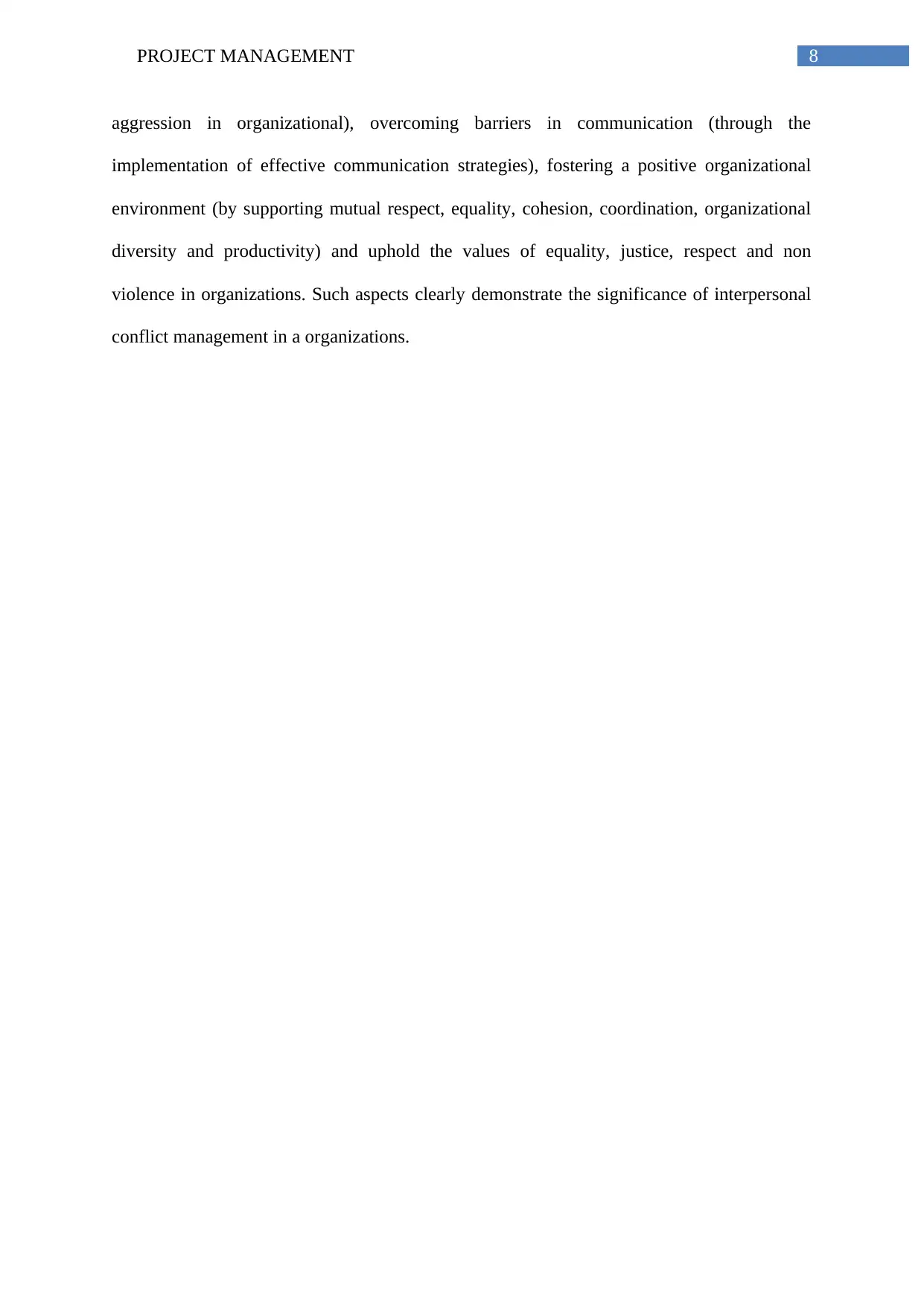
8PROJECT MANAGEMENT
aggression in organizational), overcoming barriers in communication (through the
implementation of effective communication strategies), fostering a positive organizational
environment (by supporting mutual respect, equality, cohesion, coordination, organizational
diversity and productivity) and uphold the values of equality, justice, respect and non
violence in organizations. Such aspects clearly demonstrate the significance of interpersonal
conflict management in a organizations.
aggression in organizational), overcoming barriers in communication (through the
implementation of effective communication strategies), fostering a positive organizational
environment (by supporting mutual respect, equality, cohesion, coordination, organizational
diversity and productivity) and uphold the values of equality, justice, respect and non
violence in organizations. Such aspects clearly demonstrate the significance of interpersonal
conflict management in a organizations.
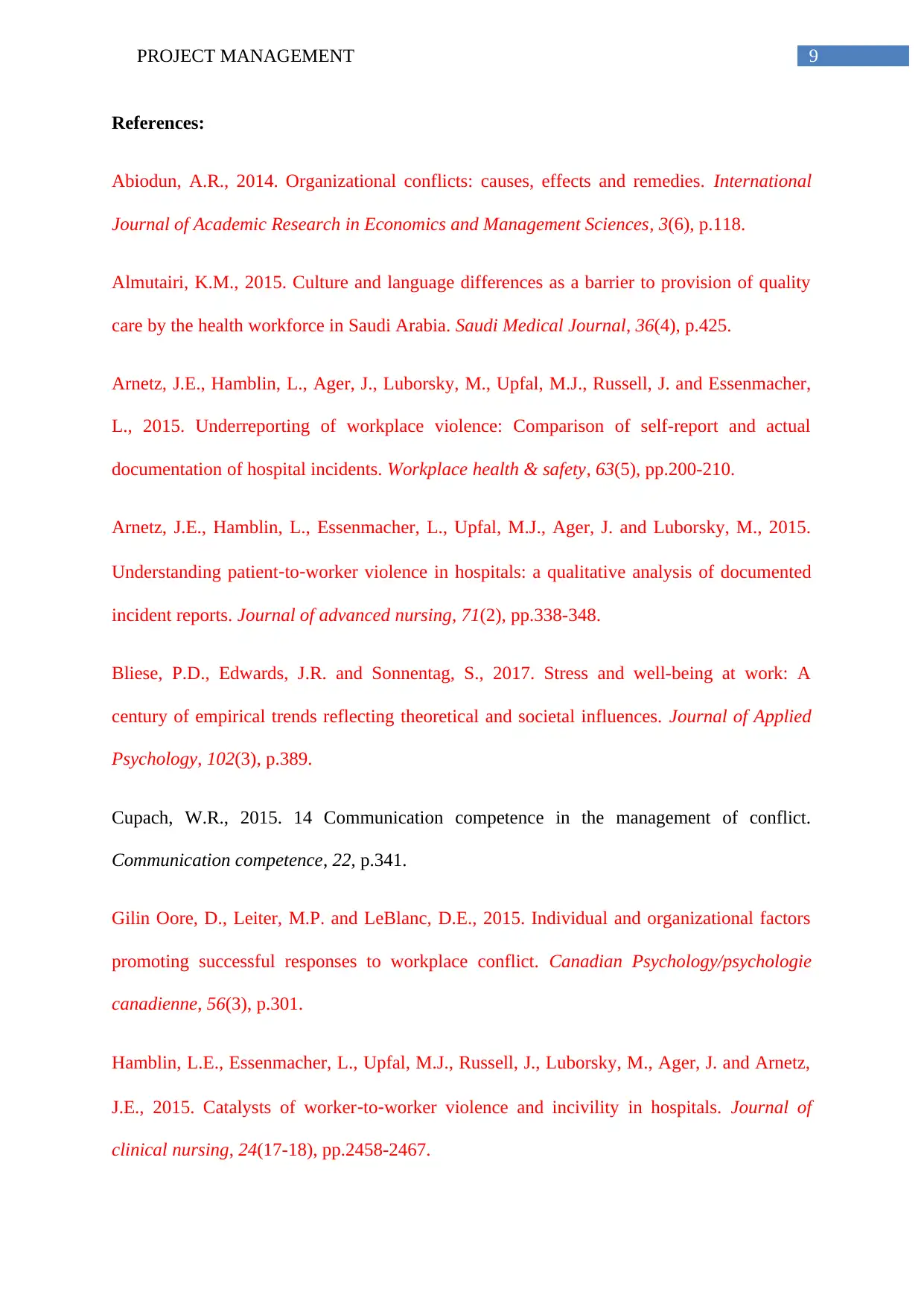
9PROJECT MANAGEMENT
References:
Abiodun, A.R., 2014. Organizational conflicts: causes, effects and remedies. International
Journal of Academic Research in Economics and Management Sciences, 3(6), p.118.
Almutairi, K.M., 2015. Culture and language differences as a barrier to provision of quality
care by the health workforce in Saudi Arabia. Saudi Medical Journal, 36(4), p.425.
Arnetz, J.E., Hamblin, L., Ager, J., Luborsky, M., Upfal, M.J., Russell, J. and Essenmacher,
L., 2015. Underreporting of workplace violence: Comparison of self-report and actual
documentation of hospital incidents. Workplace health & safety, 63(5), pp.200-210.
Arnetz, J.E., Hamblin, L., Essenmacher, L., Upfal, M.J., Ager, J. and Luborsky, M., 2015.
Understanding patient‐to‐worker violence in hospitals: a qualitative analysis of documented
incident reports. Journal of advanced nursing, 71(2), pp.338-348.
Bliese, P.D., Edwards, J.R. and Sonnentag, S., 2017. Stress and well-being at work: A
century of empirical trends reflecting theoretical and societal influences. Journal of Applied
Psychology, 102(3), p.389.
Cupach, W.R., 2015. 14 Communication competence in the management of conflict.
Communication competence, 22, p.341.
Gilin Oore, D., Leiter, M.P. and LeBlanc, D.E., 2015. Individual and organizational factors
promoting successful responses to workplace conflict. Canadian Psychology/psychologie
canadienne, 56(3), p.301.
Hamblin, L.E., Essenmacher, L., Upfal, M.J., Russell, J., Luborsky, M., Ager, J. and Arnetz,
J.E., 2015. Catalysts of worker‐to‐worker violence and incivility in hospitals. Journal of
clinical nursing, 24(17-18), pp.2458-2467.
References:
Abiodun, A.R., 2014. Organizational conflicts: causes, effects and remedies. International
Journal of Academic Research in Economics and Management Sciences, 3(6), p.118.
Almutairi, K.M., 2015. Culture and language differences as a barrier to provision of quality
care by the health workforce in Saudi Arabia. Saudi Medical Journal, 36(4), p.425.
Arnetz, J.E., Hamblin, L., Ager, J., Luborsky, M., Upfal, M.J., Russell, J. and Essenmacher,
L., 2015. Underreporting of workplace violence: Comparison of self-report and actual
documentation of hospital incidents. Workplace health & safety, 63(5), pp.200-210.
Arnetz, J.E., Hamblin, L., Essenmacher, L., Upfal, M.J., Ager, J. and Luborsky, M., 2015.
Understanding patient‐to‐worker violence in hospitals: a qualitative analysis of documented
incident reports. Journal of advanced nursing, 71(2), pp.338-348.
Bliese, P.D., Edwards, J.R. and Sonnentag, S., 2017. Stress and well-being at work: A
century of empirical trends reflecting theoretical and societal influences. Journal of Applied
Psychology, 102(3), p.389.
Cupach, W.R., 2015. 14 Communication competence in the management of conflict.
Communication competence, 22, p.341.
Gilin Oore, D., Leiter, M.P. and LeBlanc, D.E., 2015. Individual and organizational factors
promoting successful responses to workplace conflict. Canadian Psychology/psychologie
canadienne, 56(3), p.301.
Hamblin, L.E., Essenmacher, L., Upfal, M.J., Russell, J., Luborsky, M., Ager, J. and Arnetz,
J.E., 2015. Catalysts of worker‐to‐worker violence and incivility in hospitals. Journal of
clinical nursing, 24(17-18), pp.2458-2467.
Secure Best Marks with AI Grader
Need help grading? Try our AI Grader for instant feedback on your assignments.
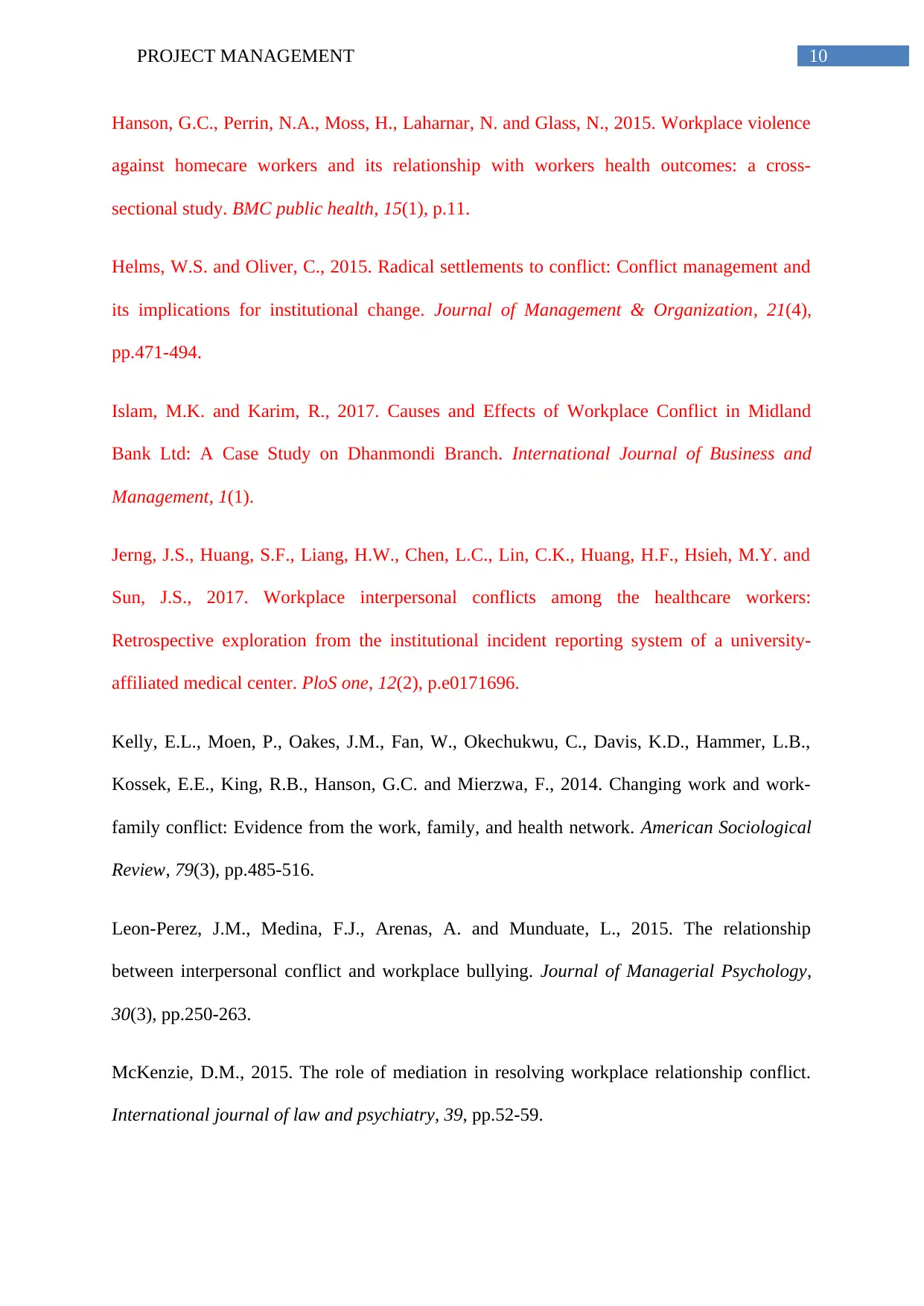
10PROJECT MANAGEMENT
Hanson, G.C., Perrin, N.A., Moss, H., Laharnar, N. and Glass, N., 2015. Workplace violence
against homecare workers and its relationship with workers health outcomes: a cross-
sectional study. BMC public health, 15(1), p.11.
Helms, W.S. and Oliver, C., 2015. Radical settlements to conflict: Conflict management and
its implications for institutional change. Journal of Management & Organization, 21(4),
pp.471-494.
Islam, M.K. and Karim, R., 2017. Causes and Effects of Workplace Conflict in Midland
Bank Ltd: A Case Study on Dhanmondi Branch. International Journal of Business and
Management, 1(1).
Jerng, J.S., Huang, S.F., Liang, H.W., Chen, L.C., Lin, C.K., Huang, H.F., Hsieh, M.Y. and
Sun, J.S., 2017. Workplace interpersonal conflicts among the healthcare workers:
Retrospective exploration from the institutional incident reporting system of a university-
affiliated medical center. PloS one, 12(2), p.e0171696.
Kelly, E.L., Moen, P., Oakes, J.M., Fan, W., Okechukwu, C., Davis, K.D., Hammer, L.B.,
Kossek, E.E., King, R.B., Hanson, G.C. and Mierzwa, F., 2014. Changing work and work-
family conflict: Evidence from the work, family, and health network. American Sociological
Review, 79(3), pp.485-516.
Leon-Perez, J.M., Medina, F.J., Arenas, A. and Munduate, L., 2015. The relationship
between interpersonal conflict and workplace bullying. Journal of Managerial Psychology,
30(3), pp.250-263.
McKenzie, D.M., 2015. The role of mediation in resolving workplace relationship conflict.
International journal of law and psychiatry, 39, pp.52-59.
Hanson, G.C., Perrin, N.A., Moss, H., Laharnar, N. and Glass, N., 2015. Workplace violence
against homecare workers and its relationship with workers health outcomes: a cross-
sectional study. BMC public health, 15(1), p.11.
Helms, W.S. and Oliver, C., 2015. Radical settlements to conflict: Conflict management and
its implications for institutional change. Journal of Management & Organization, 21(4),
pp.471-494.
Islam, M.K. and Karim, R., 2017. Causes and Effects of Workplace Conflict in Midland
Bank Ltd: A Case Study on Dhanmondi Branch. International Journal of Business and
Management, 1(1).
Jerng, J.S., Huang, S.F., Liang, H.W., Chen, L.C., Lin, C.K., Huang, H.F., Hsieh, M.Y. and
Sun, J.S., 2017. Workplace interpersonal conflicts among the healthcare workers:
Retrospective exploration from the institutional incident reporting system of a university-
affiliated medical center. PloS one, 12(2), p.e0171696.
Kelly, E.L., Moen, P., Oakes, J.M., Fan, W., Okechukwu, C., Davis, K.D., Hammer, L.B.,
Kossek, E.E., King, R.B., Hanson, G.C. and Mierzwa, F., 2014. Changing work and work-
family conflict: Evidence from the work, family, and health network. American Sociological
Review, 79(3), pp.485-516.
Leon-Perez, J.M., Medina, F.J., Arenas, A. and Munduate, L., 2015. The relationship
between interpersonal conflict and workplace bullying. Journal of Managerial Psychology,
30(3), pp.250-263.
McKenzie, D.M., 2015. The role of mediation in resolving workplace relationship conflict.
International journal of law and psychiatry, 39, pp.52-59.
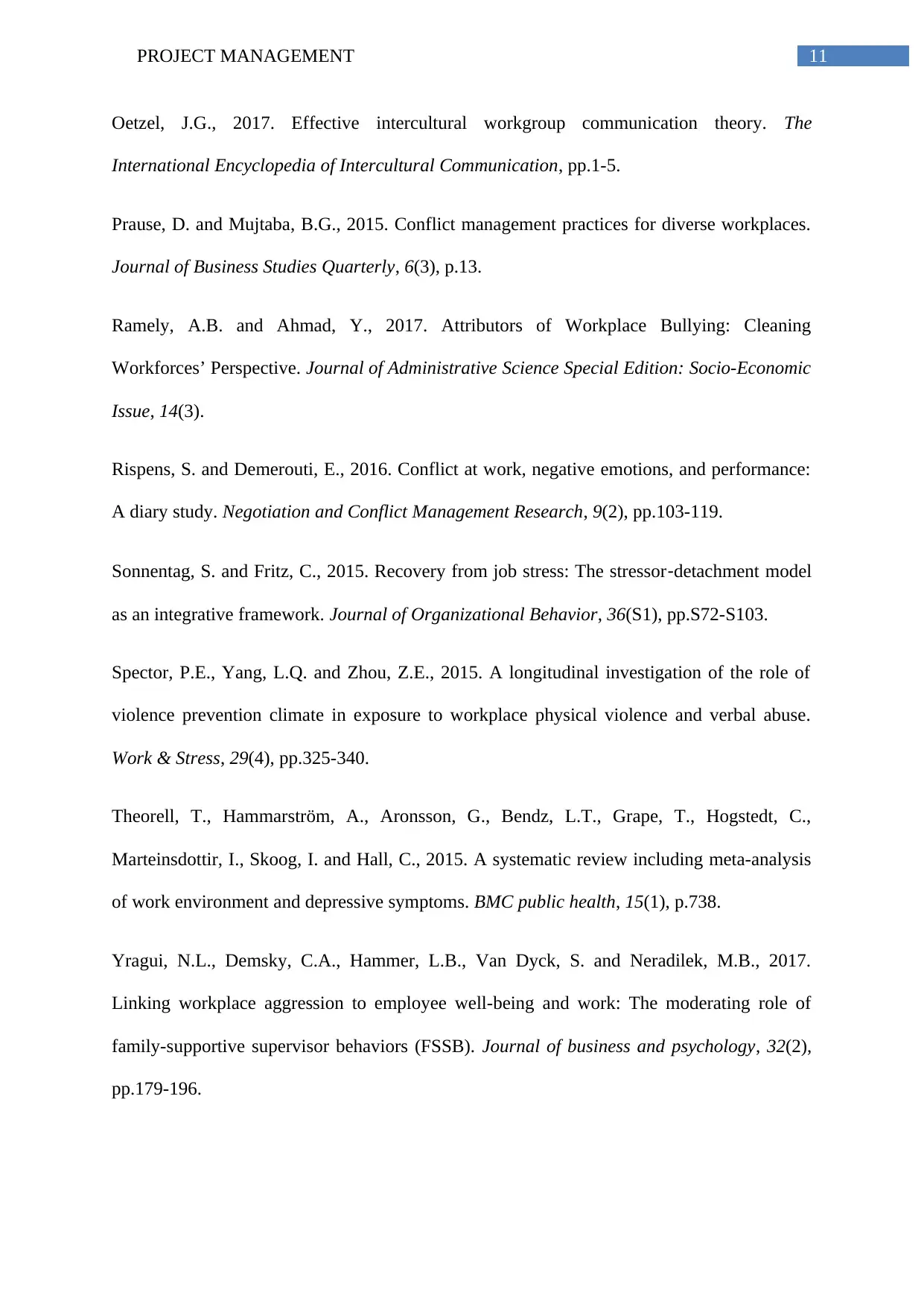
11PROJECT MANAGEMENT
Oetzel, J.G., 2017. Effective intercultural workgroup communication theory. The
International Encyclopedia of Intercultural Communication, pp.1-5.
Prause, D. and Mujtaba, B.G., 2015. Conflict management practices for diverse workplaces.
Journal of Business Studies Quarterly, 6(3), p.13.
Ramely, A.B. and Ahmad, Y., 2017. Attributors of Workplace Bullying: Cleaning
Workforces’ Perspective. Journal of Administrative Science Special Edition: Socio-Economic
Issue, 14(3).
Rispens, S. and Demerouti, E., 2016. Conflict at work, negative emotions, and performance:
A diary study. Negotiation and Conflict Management Research, 9(2), pp.103-119.
Sonnentag, S. and Fritz, C., 2015. Recovery from job stress: The stressor‐detachment model
as an integrative framework. Journal of Organizational Behavior, 36(S1), pp.S72-S103.
Spector, P.E., Yang, L.Q. and Zhou, Z.E., 2015. A longitudinal investigation of the role of
violence prevention climate in exposure to workplace physical violence and verbal abuse.
Work & Stress, 29(4), pp.325-340.
Theorell, T., Hammarström, A., Aronsson, G., Bendz, L.T., Grape, T., Hogstedt, C.,
Marteinsdottir, I., Skoog, I. and Hall, C., 2015. A systematic review including meta-analysis
of work environment and depressive symptoms. BMC public health, 15(1), p.738.
Yragui, N.L., Demsky, C.A., Hammer, L.B., Van Dyck, S. and Neradilek, M.B., 2017.
Linking workplace aggression to employee well-being and work: The moderating role of
family-supportive supervisor behaviors (FSSB). Journal of business and psychology, 32(2),
pp.179-196.
Oetzel, J.G., 2017. Effective intercultural workgroup communication theory. The
International Encyclopedia of Intercultural Communication, pp.1-5.
Prause, D. and Mujtaba, B.G., 2015. Conflict management practices for diverse workplaces.
Journal of Business Studies Quarterly, 6(3), p.13.
Ramely, A.B. and Ahmad, Y., 2017. Attributors of Workplace Bullying: Cleaning
Workforces’ Perspective. Journal of Administrative Science Special Edition: Socio-Economic
Issue, 14(3).
Rispens, S. and Demerouti, E., 2016. Conflict at work, negative emotions, and performance:
A diary study. Negotiation and Conflict Management Research, 9(2), pp.103-119.
Sonnentag, S. and Fritz, C., 2015. Recovery from job stress: The stressor‐detachment model
as an integrative framework. Journal of Organizational Behavior, 36(S1), pp.S72-S103.
Spector, P.E., Yang, L.Q. and Zhou, Z.E., 2015. A longitudinal investigation of the role of
violence prevention climate in exposure to workplace physical violence and verbal abuse.
Work & Stress, 29(4), pp.325-340.
Theorell, T., Hammarström, A., Aronsson, G., Bendz, L.T., Grape, T., Hogstedt, C.,
Marteinsdottir, I., Skoog, I. and Hall, C., 2015. A systematic review including meta-analysis
of work environment and depressive symptoms. BMC public health, 15(1), p.738.
Yragui, N.L., Demsky, C.A., Hammer, L.B., Van Dyck, S. and Neradilek, M.B., 2017.
Linking workplace aggression to employee well-being and work: The moderating role of
family-supportive supervisor behaviors (FSSB). Journal of business and psychology, 32(2),
pp.179-196.
1 out of 12
Related Documents
Your All-in-One AI-Powered Toolkit for Academic Success.
+13062052269
info@desklib.com
Available 24*7 on WhatsApp / Email
![[object Object]](/_next/static/media/star-bottom.7253800d.svg)
Unlock your academic potential
© 2024 | Zucol Services PVT LTD | All rights reserved.





